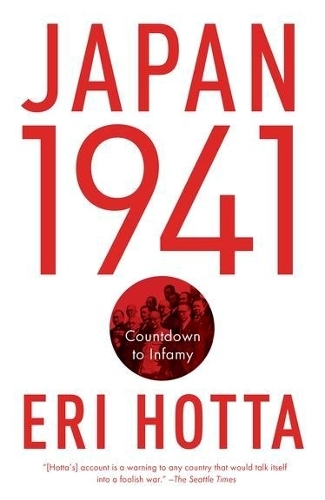
Japan 1941: Countdown to Infamy
(Paperback)
Publishing Details
Japan 1941: Countdown to Infamy
By (Author) Eri Hotta
Random House USA Inc
Random House Inc
3rd November 2014
12th August 2014
United States
Classifications
General
Non Fiction
Modern warfare
940.540952
Physical Properties
Paperback
368
Width 132mm, Height 202mm, Spine 18mm
301g
Description
A Kirkus Reviews Best Nonfiction Book of the Year A Kirkus Reviews Best Nonfiction Book of the Year A groundbreaking history that considers the attack on Pearl Harbor from the Japanese perspective and is certain to revolutionize how we think of the war in the Pacific. When Japan attacked the United States in 1941, its leaders, in large part, understood they were entering a war they were almost certain to lose. In a groundbreaking history that considers Pearl Harbor from the Japanese perspective, certain to revolutionize how we think of the war in the Pacific, Eri Hotta poses essential questions overlooked for the last seventy years- Why did these men-military men, civilian politicians, diplomats, the emperor-put their country and its citizens in harm's way Why did they make a decision that was doomed from the start Introducing us to the doubters, bluffers, and schemers who led their nation into this conflagration, Hotta brilliantly shows us a hidden Japan-eager to avoid war but fraught with tensions with the West, deluded by reckless militarism, tempted by the gambler's dream of scoring the biggest win against impossible odds and nearly escaping disaster before it finally proved inevitable.
Reviews
Hotta illuminates the extraordinary ideological and military predicament in which Japan found itself in the months before the attack on Pearl Harbor[She] brings to life the key figures of a deeply divided Japanese leadership[and] scrupulously details [their] negotiations and squabblesagainst a backdrop of dauntingly complex domestic and international maneuverings.
The New Yorker
Outstanding...In lucid prose, Hotta...persuasively sketches the very distinct personalities shaping the decisions that drove Japan toward war.She makes it clear that there are two versions of the Asia-Pacific War in China and Japan that hardly meet at all[and] concludes that after 1945, Japans actual past, with its improbable story of how the war came to pass, became another country. It is a country that policymakers in Tokyo, Beijing, and Washington should seek to understand, not least through this humane and fair-minded book.
Rana Mitter, The New York Review of Books
"ChillingConstitutes a warning of the literally earth-shattering dangers that can emerge when the political system of a powerful nation fails to work."
The New York Times Book Review
Hottas groundbreaking work is both a fascinating history and a cautionary tale for those who wield power today.
The Dallas Morning News
[Hottas] account is a warning to any country that would talk itself into a foolish war.
The Seattle Times
In this focused, informed and persuasive bookHotta effortlessly returns us to the moment just before the dice were so disastrously rolled. From a perspective little known to Americans, a masterful account of how and why World War II began.
Kirkus Reviews
A fascinating read for anyone interested in Japans involvement in World War IIWhile scholarly and thoroughly researched, its also a highly enjoyable readA real page turner.
Library Journal
In this fast-moving, persuasive account of Japan's road to Pearl Harbor, Eri Hotta describes the pathetic leadership of a country who argue among themselves endlessly when the crisis across the Pacific requires decisive action to preserve the peace. It is a story of self-delusion, irresponsibility, and ignorance from which Japan is not entirely free even today.
Akira Iriye, author of Pearl Harbor and the Coming of the Pacific War
This ambitious, groundbreaking history builds new layers atop a story that we thought we knew.
Everyday eBook
Finely nuanced[Hotta] forcefully reframes how we should consider the Japanese with respect to their positions as emerging world powers in [an]era of international turmoil.
Asian American Literature Fans
RivetingThis important book should be in every major library. It will interest anyone attempting to make sense of Pearl Harbor, the Pacific War, or bureaucratic dysfunction and its possibly tragic consequences.
Choice
Author Bio
Eri Hotta, born in Tokyo and educated in Japan, the U.S., and the U.K., has taught at Oxford, in Tokyo, and in Jerusalem, specializing in international relations.
